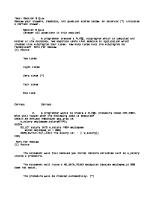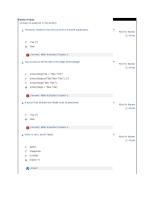Section 8 Quiz
Section 8 Quiz (Answer all questions in this section) 1. You are doing a data model for a computer sales company where
Views 896 Downloads 18 File size 75KB
Recommend stories
- Author / Uploaded
- sinta indriani
Citation preview
Section 8 Quiz (Answer all questions in this section)
1. You are doing a data model for a computer sales company where the price fluctu
A. Create a product entity and a related price entity B. Create a new item and a new price every day. C. Use a price entity with a start and end date
D. Allow them to delete the item and enter a new o E. Both A and C (*) Correct 2. What is the function of logging or journaling in conceptual data models?
Allows you to track the history of attribute values, Gives a timestamp to all entities. Creates a fixed time for all events in a data model. Represents entities as time in the data model. Correct
3. You are doing a data model for a computer sales company where the price of pos
Allow them to enter whatever delivery charge they
Update the prices in the system, print out the curren
Email current prices to all employees whenever a p
Use a Delivery Day entity, which holds prices agai Correct 4. Historical data must never be kept. True or False?
True
False (*) Correct
5. Which of the following scenarios should be modeled so that historical data is ke
(Choose all correct answers) STUDENT and AGE LIBRARY and NUMBER OF BOOKS LIBRARY and BOOK (*) STUDENT and GRADE (*) Correct Page 1 of 3
Section 8 Quiz (Answer all questions in this section) 6. Historical data should always be kept. True or False?
Mark for Review (1) Points
True False (*) Correct 7. Which of the following would be a logical constraint when modeling time for a City entity?
Mark for Review (1) Points
People are born in the city and people die in the city. Cites may change their names and/or country association if the borders of a country change. (*) Daily traffic patterns must be monitored to determine how many law enforcement officers are needed.
If you are doing a system for any French City, you would need security clearance. Correct 8. When a relationship may or may not be transferable, depending on time, this is know as a/an:
Mark for Review (1) Points
Transferable Relationship Conditional Non-transferable Relationship. (*) Non-transferable Relationship. Arc. Correct 9. In a payroll system, it is desirable to have an entity called DAY with a holiday attribute when you want to track special holiday dates. True or False?
Mark for Review (1) Points
True (*) False Correct 10.There are no circumstances where you would create a DAY entity. True or False?
Mark for Review (1) Points
True False (*) Incorrect. Refer to Section 8 Lesson 2. Page 2 of 3
Section 8 Quiz (Answer all questions in this section)
11.Which of the following would be a logical constraint when modeling time for a country entity?
Mark for Review (1) Points
If you are doing a system for France or Germany, you would need security clearance. Countries may change their names and/or borders over a period of time. (*) Daily traffic patterns must be monitored to determine which countries are overcrowded. People have births and deaths in their countries that must be tracked by the system. Correct 12.There is no point in trying to group your entities together on your diagram according to volume, and making a diagram look nice is a waste of time. True or False?
Mark for Review (1) Points
True False (*) Correct 13.Formal rules exist for drawing ERD's. You must always follow them, even if it results in an ERD that is difficult to read. True or False?
Mark for Review (1) Points
True False (*) Correct 14.Which of the following statements are true to enhance the readability of ERDs? (Choose Two)
Mark for Review (1) Points
(Choose all correct answers) Crows feet (the many-ends of relationships) should consistently point the same direction where possible, either South & East or North & West (*) Crossing relationship lines help the readability of the diagram. It does not matter which way the crows feet (many ends of a relationship) point.
Relationship lines should not cross. (*) Correct 15.In an ERD, High Volume Entities usually have very few relationships to other entities. True or False?
Mark for Review (1) Points
True False (*) Correct Page 3 of 3
Section 9 Quiz (Answer all questions in this section) 1.Why would this table name NOT work in an Oracle database? this_year_end+next_year
Mark for Review (1) Points
Table names must begin with an alphabetic character. It is too long. The Plus sign + is not allowed in object names. (*) None of the above. Correct 2.Attributes become columns in a database table. True or False?
Mark for Review (1) Points
True (*) False Correct 3.In an Oracle database, why would 1_TABLE not work as a table name?
Mark for Review
(1) Points The database does not understand all capital letters. There is no problem here. You can create a table called 1_TABLE. TABLE is a reserved word. Object names must not start with a number. They must begin with a letter. (*) Correct 4.In an Oracle database, why would the following table name not be allowed 'EMPLOYEE JOBS'?
Mark for Review (1) Points
EMPLOYEE is a reserved word JOBS is a reserved word You cannot have spaces between words in a table name (*) The database does not understand all capital letters Correct 5.When translating an arc relationship to a physical design, you must turn the arc relationships into foreign keys. What additional step must you take with the created foreign keys to ensure the exclusivity principle of arc relationships? (Assume that you are implementing an Exclusive Design) (Choose Two) (Choose all correct answers) Make all relationships mandatory Make all relationships optional (*) Create an additional check constraint to verify that one foreign key is populated and the others are not (*) All the above Correct Page 1 of 3
Section 9 Quiz
Mark for Review (1) Points
(Answer all questions in this section) 6. Which of the following is a valid reason for considering a Subtype Implementation?
Mark for Review (1) Points
The resulting table will reside in a single database and be used by just ONE user. The common access paths for the supertypes are different. Business functionality, business rules, access paths, and frequency of access are all very different between the subtypes. (*) Most of the relationships are at the supertype level. Correct 7. An "Arc Implementation" can be done just like any other Relationship - you simply add the required Foreign Keys. True or False?
Mark for Review (1) Points
True False (*) Correct 8. Foreign keys cannot be null when
Mark for Review (1) Points
It is part of a primary key (*) It contains three or more columns It refers to another table It refers to the same table Correct 9. Column integrity refers to
Mark for Review (1) Points
Columns always containing values consistent with the defined data format (*) Columns always containing text data less than 255 characters Columns always having values
Columns always containing positive numbers Correct 10.The explanation below is an example of which constraint type? If the value in the balance column of the ACCOUNTS table is below 100, we must send a letter to the account owner which will require extra programming to enforce.
Mark for Review (1) Points
User-defined integrity (*) Referential integrity Column integrity Entity integrity Correct Page 2 of 3
Section 9 Quiz (Answer all questions in this section) 11.A foreign key cannot refer to a primary key in the same table. True or False?
Mark for Review (1) Points
True False (*) Correct 12.An Arc is transformed to the physical model by adding a foeign Key for every relationship in the Arc. True or False?
Mark for Review (1) Points
True (*) False Incorrect. Refer to Section 9 Lesson 3.
13.In a physical model, many to many relationships are resolved via a structure called a(n): ________________
Mark for Review (1) Points
Subtype Intersection Entity (*) Supertype Intersection Table Correct 14.To resolve a many to many relationship in a physical model you create a(n) ___________________?
Mark for Review (1) Points
Intersection table (*) Intersection entity Unique key constraints Two tables with Foreign key constraints between them Correct 15.Relationships on an ERD can only be transformed into UIDs in the physical model? True or False?
Mark for Review (1) Points
True False (*) Correct Page 3 of 3









